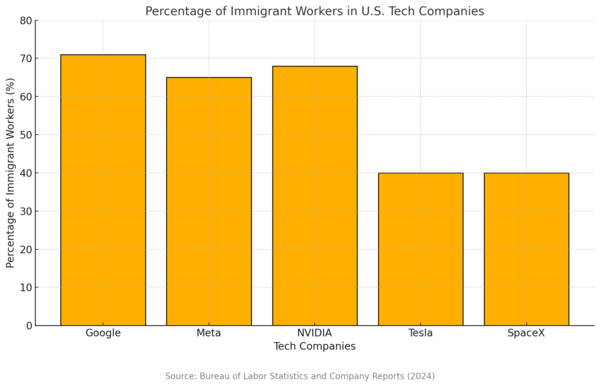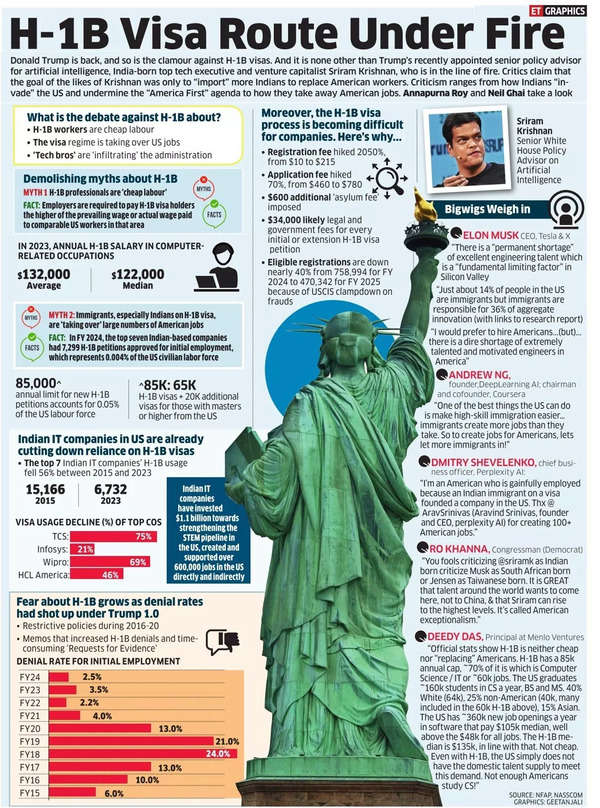Take a large step up and punch yourself in the face. **
Even by Elon Musk‘s sui generis standards, this post on X ( formerly Twitter ) was a chef’s kiss of acrimony. His rousing response was directed at a Trump supporter who had criticized H-1B permits but wasn’t directed at administrators or the typical “blue test” brigade. Musk’s ferocious defense was not just about himself; it was also a labyrinth that was thrown down in a conflict that has erupted within the Democratic tent.
Musk’s Unfiltered Defense of H-1B Visas
” The reason I’m in America, along with so many important people who built SpaceX, Tesla, and lots of different companies that made America robust, is because of H-1B”, Musk wrote. Then, with all the subtlety of a flamethrower ( one he probably designed himself ),” Take a big step back and F*** YOURSELF in the face. I may declare war on this matter in a manner that is beyond your comprehension. Of course, fans will notice it’s a key line from Tropic Thunder ( see post above ).
The battle cry was a device fall in the middle of an ongoing MAGA civil war over experienced immigration. It wasn’t just another Musk moment.
MAGA vs. Tech Bros: The Immigration Collapse
On one side, you’ve got the technical giants—Musk, Google, Meta, NVIDIA—all fervent advocates of the H-1B card software. For Silicon Valley, the statistics speak louder than words: over 70 % of technical workers in companies like Google, Meta, and NVIDIA are foreign-born, with some arriving via the H-1B system. Refugees make up nearly 40 % of the workplace at SpaceX and Tesla, especially in highly specialized positions like architecture and AI.

Google’s family business, Alphabet, employs over 150, 000 persons worldwide, with a major part in complex roles being H-1B card holders. Also, Meta has over 86, 000 people, with around 65 % in technical and engineering tasks filled by newcomers. At NVIDIA, the leader in AI and GPU technologies, immigrants constitute more than 68 % of their technical team, driving innovations that dominate global markets.
In the last governmental year, 70 % of all H-1B visa approvals went to tech firms, highlighting their emphasis on this plan to sustain growth and innovation. However, an estimated 300, 000 H-1B card holders are stuck in natural card backlogs, mostly from countries like India, waiting for over a decade to get permanent residency.
Why Do US Techs Need a Lifeline With Their H-1B Visa?

The U. S. problems 85, 000 H-1B permits periodically, split between 65, 000 new permits and 20, 000 for advanced level buyers. Despite these statistics, the demand far outweighs supply, with firms filing over 780, 000 programs in 2024 only. This software isn’t really a pleasure, it’s the core of America’s technology supremacy.
Companies like Tesla, SpaceX, and Apple thrive on international expertise pools. SpaceX’s advances in reusable missiles, Starlink satellite implementation, and interplanetary inquiry have been strongly supported by immigrant engineers. Furthermore, Tesla’s advancements in electric cars and AI-driven automatic systems owe much to its worldwide different workforce.
The Nativist Counterpoint
Despite its achievement, the H-1B system isn’t without reviewers. The nationalist wing of the MAGA claims that the program causes lower wages and displaces American workers. They cite cases of abuse where businesses employ less expensive foreign workers over equally competent American. A 2023 Department of Labor statement noted that 12 % of H-1B programs were flagged for wage contradictions, fueling these charges.
Far-right characters like Laura Loomer have used these states to pin software leaders, framing them as out-of-touch leaders prioritizing gains over loyalty. This conflict highlights the wider MAGA gap: a group supporting economic patriotism and a group supporting a group that views immigration as a corporate necessity.
Musk’s Argument: The Figures Don’t Stay
Musk and his supporters argue that the U. S. doesn’t own a talent deficit but a deficit. According to the Bureau of Labor Statistics, there are virtually 500, 000 empty tech work in the U. S., ranging from application development to security. Institutions produce about 50, 000 computer science graduates periodically, a fraction of what the business needs.
Also, the efforts of H-1B staff extend beyond filling jobs. Immigrant-led startups account for 55 % of the unicorn companies in Silicon Valley, with a combined valuation exceeding$ 1 trillion. Immigrants like Sundar Pichai ( Google ), Satya Nadella ( Microsoft ), and Jensen Huang ( NVIDIA ) didn’t just fill jobs—they redefined industries.
The Future of H-1B: Reformation or Retrench?
As the H-1B conversation heats up, ideas for reform have emerged. Proponents suggest removing country-specific green cards caps, increasing immigration restrictions, and enhancing channels for H-1B workers to achieve permanent residency. These changes, they argue, may reduce abuse and unlock the full potential of qualified immigrants.
Opponents, however, require stricter supervision to prevent crimes and promote hiring American workers. Trump has walked a rope on this front, applauding merit-based immigration while placating his nationalist center.
Musk’s War Cry and America’s Dilemma
This isn’t just about visa. Musk’s rebellion captures a larger conflict involving the realities of a multinational future and nostalgia for the past. As the MAGA partnership injuries over H-1B, the bets don’t get higher. Does the United States abandon its isolationist policies or embrace worldwide skill that drives its innovation?
For Musk, the answer is apparent. He’ll have the best thoughts from around the world as he develops rockets to Mars and AI to transform industries. It’s unknown whether America’s immigration procedures adhere to that vision. One thing’s specific: this struggle is far from over, and the future of British development hangs in the balance.




